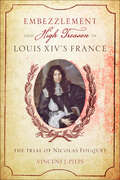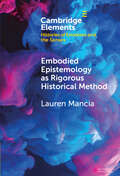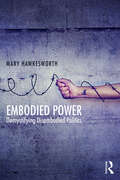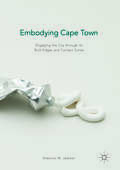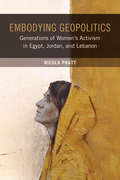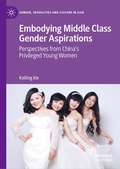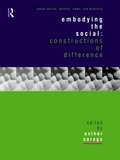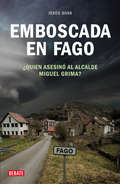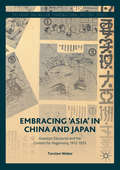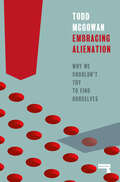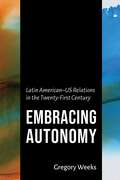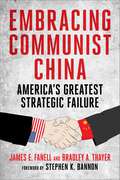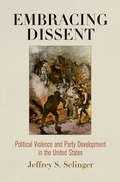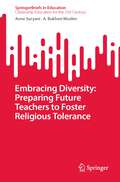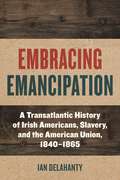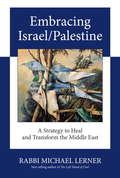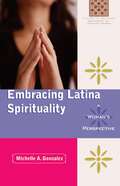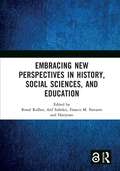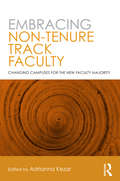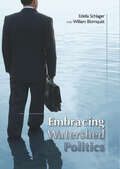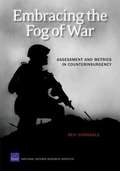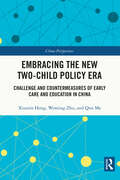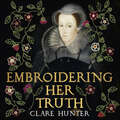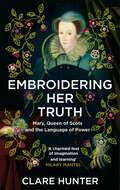- Table View
- List View
Embezzlement and High Treason in Louis XIV's France: The Trial of Nicolas Fouquet
by Vincent J. PittsLouis XIV’s vendetta against his disgraced finance minister exposed dark truths about the state's finances.From 1661 to 1664, France was mesmerized by the arrest and trial of Nicolas Fouquet, the country’s superintendent of finance. Prosecuted on trumped-up charges of embezzlement, mismanagement of funds, and high treason, Fouquet managed to exonerate himself from all of the major charges over the course of three long years, in the process embarrassing and infuriating Louis XIV. The young king overturned the court’s decision and sentenced Fouquet to lifelong imprisonment in a remote fortress in the Alps.A dramatic critique of absolute monarchy in pre-revolutionary France, Embezzlement and High Treason in Louis XIV's France tells the gripping tale of an overly ambitious man who rose rapidly in the state hierarchy—then overreached. Vincent J. Pitts uses the trial as a lens through which to explore the inner workings of the court of Louis XIV, who rightly feared that Fouquet would expose the tawdry financial dealings of the king's late mentor and prime minister, Cardinal Mazarin.
Embodied Epistemology as Rigorous Historical Method (Elements in Histories of Emotions and the Senses)
by Lauren ManciaThis Element proposes that, in addition to using traditional historical methodologies, historians need to find extra-textual, embodied ways of understanding the past in order to more fully comprehend it. Written by a medieval historian, the Element explains why historians assume they cannot use reperformance in historical inquiry and why they, in fact, should. The Element employs tools from the discipline of performance studies, which has long grappled with the differences between the archive and the repertoire, between the records of historical performances and the embodied movements, memories, and emotions of the performance itself, which are often deemed unknowable by scholars. It shows how an embodied epistemology is particularly suited to studying certain premodern historical topics, using the example of medieval monasticism. Finally, using the case of performance-lectures given at The Met Cloisters, it shows how using performance as a tool for historical investigation might work.
Embodied Power: Demystifying Disembodied Politics
by Mary HawkesworthEmbodied Power explores dimensions of politics seldom addressed in political science, illuminating state practices that produce hierarchically-organized groups through racialized gendering—despite guarantees of formal equality. Challenging disembodied accounts of citizenship, the book traces how modern science and law produce race, gender, and sexuality as purportedly natural characteristics, masking their political genesis. Taking the United States as a case study, Hawkesworth demonstrates how diverse laws and policies concerning civil and political rights, education, housing, and welfare, immigration and securitization, policing and criminal justice create finely honed hierarchies of difference that structure the life prospects of men and women of particular races and ethnicities within and across borders. In addition to documenting the continuing operation of embodied power across diverse policy terrains, the book investigates complex ways of seeing that render raced-gendered relations of domination and subordination invisible. From common assumptions about individualism and colorblind perception to disciplinary norms such as methodological individualism, methodological nationalism, and abstract universalism, problematic presuppositions sustain mistaken notions concerning formal equality and legal neutrality that allow state practices of racialized gendering to escape detection with profound consequences for the life prospects of privileged and marginalized groups. Through sustained critique of these flawed suppositions, Embodied Power challenges central beliefs about the nature of power, the scope of state action, and the practice of liberal democracy and identifies alternative theoretical frameworks that make racialized-gendering visible and actionable. Key Features: Demonstrates how understandings of politics change when the experiences of men and women of diverse classes, races, and ethnicities are placed at the center of analysis. Explains why race-neutral and gender-neutral policies fail to eliminate entrenched inequalities. Shows how accredited methods in political science (and the social sciences more generally) mask state practices that create and sustain racial and gender inequality. Traces how mistaken notions of biological determinism have diverted attention from political processes of racialization, gendering, and sexualization. Argues that the intersecting categories of race, class, gender, and sexuality are essential to all subfields of political science if contemporary power is to be studied systematically.
Embodying Cape Town
by Shannon M. JacksonThis book examines the reciprocity that exists between the body and the urban built environment. It will draw on archival and ethnographic research as well as an interdisciplinary literature on cultural materialism, semiotics, and aesthetics to challenge dualist interpretations of four different points of historical-material contact in Cape Town, South Africa. Each chapter attends to different groups, social practices, and historical periods, but all share the fundamental questions: how does material culture reflect the way social agents make meaning through bodily contact with urban built form, and how does such meaning challenge the ways bodies are objectified? Further, how can we make sense of the historical processes embedded in the objectification of bodies without treating the social and the material, the mental and the physical as separate realities?
Embodying Geopolitics: Generations of Women’s Activism in Egypt, Jordan, and Lebanon
by Nicola PrattWhen women took to the streets during the mass protests of the Arab Spring, the subject of feminism in the Middle East and North Africa returned to the international spotlight. In the subsequent years, countless commentators treated the region’s gender inequality as a consequence of fundamentally cultural or religious problems. In so doing, they overlooked the specifically political nature of these women’s activism. Moving beyond such culturalist accounts, this book turns to the relations of power in regional and international politics to understand women’s struggles for their rights. Based on over a hundred extensive personal narratives from women of different generations in Egypt, Jordan, and Lebanon, Nicola Pratt traces women’s activism from national independence through to the Arab uprisings, arguing that activist women are critical geopolitical actors. Weaving together these personal accounts with the ongoing legacies of colonialism, Embodying Geopolitics demonstrates how the production and regulation of gender is integrally bound up with the exercise and organization of geopolitical power, with consequences for women’s activism and its effects.
Embodying Middle Class Gender Aspirations: Perspectives from China’s Privileged Young Women (Gender, Sexualities and Culture in Asia)
by Kailing XieThis book takes a feminist approach to analyse the lives of well-educated urban Chinese women, who were raised to embody the ideals of a modern Chinese nation and are largely the beneficiaries of the policy changes of the post-Mao era. It explores young women’s gendered attitudes to and experiences of marriage, reproductive choices, careers and aspirations for a good life. It sheds light on what keeps mainstream Chinese middle-class women conforming to the current gender regime. It illuminates the contradictory effects of neoliberal techniques deployed by a familial authoritarian regime on these women’s striving for success in urban China, and argues that, paradoxically, women’s individualistic determination to succeed has often led them onto the path of conformity by pursuing exemplary norms which fit into the party-state’s agenda.
Embodying the Social: Constructions of Difference
by Esther SaragaThis book opens the series with a consideration of the social construction of social difference. Taking the body as the point of departure, it deals with the processes through which social problems and social inequalities are constructed. In particular, it examines the shifting ways in which our ideas about issues such as 'disability', 'race' and ethnicity, and sexuality influence the development of social policies.
Emboscada en Fago
by Jesús Duva¿Quién mató al alcalde Miguel Grima? ¿Qué ocultaba ese idílico pueblo pirenaico? ¿Cómo se pudo incubar tanto odio en un lugar tan pequeño? La extraordinaria investigación de un caso que conmovió a España. El 12 de enero de 2007, tras una rutinaria reunión en Jaca (Huesca) de los municipios de la zona, Miguel Grima tomó la carretera de vuelta a Fago, el pequeño pueblo del que era alcalde. Eran apenas sesenta kilómetros, pero nunca volvió a su casa. Poco antes de llegar, unas piedras en la calzada le habían obligado a bajarse del coche para apartarlas. En ese momento recibió un disparo de un cartucho cargado con nueve postas que acabó con su vida. Un tercio de los treinta vecinos se convirtieron de inmediato en sospechosos. La investigación pronto reveló los odios y rencillas existentes: el municipio era una olla a presión. Al poco tiempo, uno de los vecinos, Santiago Mainar, se derrumbó antela Guardia Civil y confesó, pero desde su detención lo niega todo. El caso está pendiente de juicio. Esta extraordinaria investigación del veterano periodista Jesús Duva, uno de los primeros en llegar al lugar tras el asesinato, recrea el ambiente asfixiante que había en ese microcosmos del Pirineo aragonés y presenta los elementos clave para entender un caso que conmovió a España.
Embracing 'Asia' in China and Japan
by Torsten WeberThis book examines how Asianism became a key concept in mainstream political discourse between China and Japan and how it was used both domestically and internationally in the contest for political hegemony. It argues that, from the early 1910s to the early 1930s, this contest changed Chinese and Japanese perceptions of 'Asia', from a concept that was foreign-referential, foreign-imposed, peripheral, and mostly negative and denied (in Japan) or largely ignored (in China) to one that was self-referential, self-defined, central, and widely affirmed and embraced. As an ism, Asianism elevated 'Asia' as a geographical concept with culturalist-racialist implications to the status of a full-blown political principle and encouraged its proposal and discussion vis-#65533;-vis other political doctrines of the time, such as nationalism, internationalism, and imperialism. By the mid-1920s, a great variety of conceptions of Asianism had emerged in the transnational discourse between Japan and China. Terminologically and conceptually, they not only paved the way for the appropriation of 'Asia' discourse by Japanese imperialism from the early 1930s onwards but also facilitated the embrace of Sino-centric conceptions of Asianism by Chinese politicians and collaborators.
Embracing Alienation: Why We Shouldnt Try to Find Ourselves
by Todd McgowanThe left views alienation as something to be resisted or overcome, but could it actually form the basis of our emancipation?In Embracing Alienation, Todd McGowan offers a completely different take on alienation, claiming that the effort to overcome it is not a radical response to the current state of things but a failure to see the constitutive power of alienation for all of us. Instead of trying to overcome alienation and accede to an unalienated existence, it argues, we should instead redeem alienation as an existential and political program.Engaging with Shakespeare&’s great tragedies, contemporary films such as Don&’t Worry Darling, and even what occurs on a public bus, as well as thinkers such as Descartes, Hegel, and Marx, McGowan provides a concrete elaboration of how alienation frees people from their situation. Relying on the tradition of dialectical thought and psychoanalytic theory, Embracing Alienation reveals a new way of conceiving how we measure progress — or even if progress should be the aim at all.
Embracing Autonomy: Latin American–US Relations in the Twenty-First Century (The Americas in the World Series)
by Gregory WeeksGregory Weeks's Embracing Autonomy departs from other general treatments of Latin American-US relations not by putting US policy aside but by bringing in the Latin American and global contexts more closely and thus avoiding the incomplete picture provided by a narrow focus solely on the policies of the United States.The core of autonomy for Latin America from the United States is seen in new, deeper, and more numerous relationships that do not include the United States. The book is not a study of rebellion against the United States, or even a critique of US policy. Instead, it is an examination of the major shifts that have taken place in the region in recent decades and how they have shaped Latin American-US relations.Weeks's book provides a clearer understanding of where Latin America stands vis-à-vis the United States in the early twenty-first century. In doing so, we gain a better sense of the trajectory of Latin American-US relations and how they develop in turbulent times.
Embracing Communist China: America's Greatest Strategic Failure
by James Fanell Bradley ThayerFor decades, the United States has underestimated the threat from the People&’s Republic of China (PRC). In doing so, it has left our country vulnerable to their devious plans—a profound, strategic miscalculation. As a result of this carelessness, the United States is at risk of losing its dominant position in global politics. But how did this happen? How was it possible that the US could lose its dominant position after its Cold War victory and allow the rise of a peer enemy over a short period of time—about thirty years? In Embracing Communist China, authors James E. Fanell and Bradley A. Thayer get to the bottom of this heinous miscalculation. Broken down into three central arguments, Fanell and Thayer lay out not only the reason for China&’s rise in power, but how the United States could have prevented it. Due to failures on the parts of the national security commission, strategists, military personnel, and the intelligence community, a historical case of &“threat deflation&” caused our country to refute all supplied information of China&’s growing power. By not taking this seriously, the PRC has risen with the goal of usurping the US as a global superpower. US business interests and financiers trumped strategy. Seeing China as a source of cheap labor for manufacturing, investment, and intellectual labor—including for research and development—the mighty dollar&’s influence reigned supreme, overlooking the big picture. With their advancements, China used its political warfare strategy to promote threat deflation under Deng Xiaoping. As such, the PRC—learning key lessons from the Soviet Union&’s mistakes in the Cold War—focused on elites from all aspects of US and other Western societies, enriching them and shaping their perception of China and of Chinese Communist Party (CCP) while using the enticement of a growing market to influence their behavior. As Americans, we can no longer think of China as a secondary power, but one that is looking to remove the US as the most powerful country in the world. By understanding the profound strategic failures made by the US are we are able to correct them and so defeat the PRC as the we did the Soviet Union.
Embracing Dissent: Political Violence and Party Development in the United States (American Governance: Politics, Policy, and Public Law)
by Jeffrey S. SelingerWhile the American founders fully expected parties to form in a free society, they were far less certain that opposing parties would peacefully transfer power from one to another. Party formation presented a confounding problem for the new republic: party rivalries could not be prevented, but they might, nonetheless, catalyze civil disorder or fracture the union of the states. The status of political parties has come a long way in American society and politics, however, and today American democracy is inconceivable without them.How did party competition become a regular and "normal" feature of the American political landscape? Why did American political leaders, who viewed such rivalry as a harbinger of the new republic's destruction, come to terms with party opposition? Embracing Dissent tells this story of political transformation, making the case that the status of party gained ground as the notion that party competition might instigate class violence, secession, or civil war, receded. From the American founding and the appearance of the Jacksonian Democratic party, to Lincoln's management of party politics during the Civil War, Jeffrey S. Selinger presents a careful reconsideration of American political development.Embracing Dissent also provides historical perspective on today's polarized political condition. Too often, pundits exaggerate the significance of partisan differences and minimize the depth of political consensus that permeates American politics. Political observers casually use expressions like "party conflict," forgetting, as the famed political scientist Giovanni Sartori noted, that public consensus on fundamental legal and constitutional norms makes party competition "something less than conflict, as we endlessly if often too late rediscover whenever we are confronted with the reality of a people shooting at each other." Embracing Dissent reminds readers of the long history of Americans "shooting at each other" and describes the political events that disarmed them.
Embracing Diversity: Preparing Future Teachers to Foster Religious Tolerance (SpringerBriefs in Education)
by Anne Suryani A. Bukhori MuslimThis book presents a detailed discussion of Indonesian future teachers’ experience of religious diversity, tolerance and intolerance, their level of intellectual humility, and intentions to foster religious tolerance. Drawing from large-scale mixed methods research conducted in Indonesian universities involving over one thousand three hundred future teachers from diverse religious backgrounds, this book demonstrates that religion and religious beliefs can, and do, shape the way future teachers view their teaching practices and pedagogies. The book sheds light into the under-researched yet prominent issue of integrating tolerance into teacher education preparation. It is set in the largest Muslim-majority country in the world which, in recent years, has seen a gradual degradation of secularity while religion becomes more dominant across all levels and sectors of society. This novel and timely book is of interest to researchers, scholars, and students in religious studies, education, social sciences, and Asian studies, as well as anyone interested in the interplay between religion and education in the 21st century.
Embracing Emancipation: A Transatlantic History of Irish Americans, Slavery, and the American Union, 1840-1865 (Reconstructing America)
by Ian DelahantyWINNER, 2024 LAWRENCE J. McCAFFREY PRIZE FOR BEST BOOK ON IRISH AMERICAChallenges conventional narratives of the Civil War era that emphasize Irish Americans’ unceasing opposition to Black freedomEmbracing Emancipation tackles a perennial question in scholarship on the Civil War era: Why did Irish Americans, who claimed to have been oppressed in Ireland, so vehemently opposed the antislavery movement in the United States? Challenging conventional answers to this question that focus on the cultural, political, and economic circumstances of the Irish in America, Embracing Emancipation locates the origins of Irish American opposition to antislavery in famine-era Ireland. There, a distinctively Irish critique of abolitionism emerged during the 1840s, one that was adopted and adapted by Irish Americans during the sectional crisis. The Irish critique of abolitionism meshed with Irish Americans’ belief that the American Union would uplift Irish people on both sides of the Atlantic—if only it could be saved from the forces of disunion.Whereas conventional accounts of the Civil War itself emphasize Irish immigrants’ involvement in the New York City draft riots as a brutal coda to their unflinching opposition to emancipation, Delahanty uncovers a history of Irish Americans who embraced emancipation. Irish American soldiers realized that aiding Black southerners’ attempts at self-liberation would help to subdue the Confederate rebellion. Wartime developments in the United States and Ireland affirmed Irish American Unionists’ belief that the perpetuity of their adopted country was vital to the economic and political prospects of current and future immigrants and to their hopes for Ireland’s independence. Even as some Irish immigrants evinced their disdain for emancipation by lashing out against Union authorities and African Americans in northern cities, many others argued that their transatlantic interests in restoring the Union now aligned with slavery’s demise. While myriad Irish Americans ultimately abandoned their hostility to antislavery, their backgrounds in and continuously renewed connections with Ireland remained consistent influences on how the Irish in America took part in debate over the future of American slavery.
Embracing Israel/Palestine: A Strategy to Heal and Transform the Middle East
by Michael LernerA major modern conundrum is how the Arab/Israel conflict remains unresolved and, seemingly, unresolvable. In this inspirational book, Rabbi Michael Lerner suggests that a change in consciousness is crucial. With clarity and honesty, he examines how the mutual demonization and discounting of each sides' legitimate needs drive the debate, and he points to new ways of thinking that can lead to a solution. Lerner emphasizes that this new approach to the issue requires giving primacy to love, kindness, and generosity. It calls for challenging the master narratives in both Israel and Palestine as well as the false idea that "homeland security" can be achieved through military, political, economic, or media domination. Lerner makes the case that a lasting peace must prioritize helping people on all sides (including Europe and the U.S.) and that real security is best achieved through an ethos of caring and generosity toward "the other." As many spiritual leaders have taught, problems like these cannot be solved at the same level at which they originated--one must seek higher ground, and that becomes a central task for anyone who wants a sustainable peace. Embracing Israel/Palestine is written for those looking for positive, practical solutions to this ongoing dilemma.(From the Trade Paperback edition.)
Embracing Latina Spirituality: A Woman's Perspective
by Michelle A. Gonzalez“The richness of Latina spirituality can be a source for all Catholic women to find the celebration amidst the struggle and the sacred in the everyday.” Latinas treat the sacred in ways that are similar to the ways we treat those we encounter every day: They converse with statues of saints and Mary, leave them flowers and light candles to persuade them to gain favor for us, and become angry when prayers are not answered. These everyday aspects of Latina spirituality reflect a strong sense of family and community that we can embrace as a refreshing spiritual alternative to the individualism that permeates our society. Entering into the world of Latina spirituality offers new ways to understand self and community and to approach prayer, diversity and the struggle against oppression. Latina spirituality provides us an entry point into true unity.
Embracing New Perspectives in History, Social Sciences, and Education: Proceedings of the International Conference on History, Social Sciences, and Education (ICHSE 2021), Malang, Indonesia, 11 September 2021
by Francis M. Navarro Ronal Ridhoi Arif Subekti HariyonoThis book provides a collection of articles resulting from the International Conference on History, Social Sciences, and Education (ICHSE), which was held on 11 September 2021. The Department of History of Malang State University choose "Embracing New Perspectives in History, Social Sciences, and Education" as the main topic, and elaborates on five subthemes: 1) new trends in historical research; 2) formulation of new perspectives in history, social sciences, and education; 3) transdisciplinary research in history, social sciences, and education; 4) innovations in historical and social science learning during pandemics; 5) New ideas in the research and practice of social sciences and education. This seminar was open to international academics.This book presents new perspectives on methodology, methods, theory, and themes on history, social sciences, and education research from various perspectives on methodology and historiography. Now, history is not only about politics, economy and military, but also about environment, social, education, culinary, and so on. This book will be useful for students, historians, and the general public, in recording the development of Indonesian historical writing perspectives.
Embracing Non-Tenure Track Faculty: Changing Campuses for the New Faculty Majority
by Adrianna KezarThe nature of the higher education faculty workforce is radically and fundamentally changing from primarily full-time tenured faculty to non-tenure track faculty. This new faculty majority faces common challenges, including short-term contracts, limited support on campus, and lack of a professional career track. Embracing Non-Tenure Track Faculty documents real changes occurring on campuses to support this faculty group, unveiling the challenges and opportunities that occur when implementing new policies and practices. Non-tenure faculty contributors across a diverse range of universities and colleges explore the change process on their campuses to improve the work environment and increase the quality of learning. Kezar supplements these case studies by distilling trends and patterns from a national study of campuses that have successfully implemented policies to improve conditions for non-tenure track faculty. This invaluable research-based resource illustrates that there are multiple pathways to successfully implementing policy for non-tenure track faculty. Embracing Non-Tenure Track Faculty provides the tools to create a lasting culture change that will shape the work lives of all faculty and ultimately improve student learning. Outlining detailed strategies and approaches for providing equitable policies and practices for non-tenure track faculty on college campuses, this book is essential reading for both contingent faculty and higher education administrators.
Embracing Watershed Politics
by Edella SchlagerAs Americans try to better manage and protect the natural resources of our watersheds, is politics getting in the way? Why does watershed management end up being so political? In Embracing Watershed Politics, political scientists Edella Schlager and William Blomquist provide timely illustrations and thought-provoking explanations of why political considerations are essential, unavoidable, and in some ways even desirable elements of decision making about water and watersheds. With decades of combined study of water management in the United States, they focus on the many contending interests and communities found in America's watersheds, the fundamental dimensions of decision making, and the impacts of science, complexity, and uncertainty on watershed management. Enriched by case studies of the organizations and decision making processes in several major U.S. watersheds (the Delaware River Basin, San Gabriel River, Platte River, and the Columbia River Basin), Embracing Watershed Politics presents a reasoned explanation of why there are so few watershed-scale integrated management agencies and how the more diverse multi-organizational arrangements found in the vast majorities of watersheds work. Although the presence of multiple organizations representing a multitude of communities of interest complicates watershed management, these institutional arrangements can-under certain conditions-suit the complexity and uncertainty associated with watershed management in the twenty-first century.
Embracing the Fog of War: Assessment and Metrics in Counterinsurgency
by Ben ConnableThe unpredictable counterinsurgency environment challenges centralized, quantitative campaign assessment. A comprehensive examination of the centralized, quantitative approach to assessment, as described inthe literature and doctrine and applied in two primary case studies (Vietnam and Afghanistan), reveals weaknesses and gaps and proposes an alternative process: contextual assessment.
Embracing the New Two-Child Policy Era: Challenge and Countermeasures of Early Care and Education in China (China Perspectives)
by Xiumin Hong Wenting Zhu Qun MaCrafted from a research project that lasted for three years, this book examines the impacts of China’s universal two-child policy under the lens of education and focuses specifically on early childhood. This book not only provides number projection, but also the prediction and judgment of the supply and demand of service resources in early childhood education. It attempts to reveal the attitudes and views of families and stakeholders on the universal two-child policy and present the public's policy requirements for the quality of early childhood education. In addition, it analyses possible problems and challenges in current kindergarten layouts and resources allocation. Lastly, it aims to provide references and bases for formulating the plan that adapts to changes of Chinese preschoolers, supply guarantee of future early childhood education and the construction of public service system. Offering rich insights into the current and future status of education in China, this text will be of interest to students, scholars, and researchers of sociology, early childhood education, contemporary China studies, East Asian educational practices and policy.
Embroidering Her Truth: Mary, Queen of Scots and the Language of Power
by Clare HunterAn alternative biography of Mary, Queen of Scots through the textiles of her life from the author of Sunday Times bestseller Threads of Life.I felt that Mary was there, pulling at my sleeve, willing me to appreciate the artistry, wanting me to understand the dazzle of the material world that shaped her.At her execution Mary, Queen of Scots wore red. Widely known as the colour of strength and passion, it was in fact worn by Mary as the Catholic symbol of martyrdom.In sixteenth-century Europe women's voices were suppressed and silenced. Even for a queen like Mary, her prime duty was to bear sons. In an age when textiles expressed power, Mary exploited them to emphasise her female agency. From her lavishly embroidered gowns as the prospective wife of the French Dauphin to the fashion dolls she used to encourage a Marian style at the Scottish court and the subversive messages she embroidered in captivity for her supporters, Mary used textiles to advance her political agenda, affirm her royal lineage and tell her own story.In this eloquent cultural biography, Clare Hunter exquisitely blends history, politics and memoir to tell the story of a queen in her own voice.(P) Hodder & Stoughton Limited
Embroidering Her Truth: Mary, Queen of Scots and the Language of Power
by Clare HunterI felt that Mary was there, pulling at my sleeve, willing me to appreciate the artistry, wanting me to understand the dazzle of the material world that shaped her.At her execution Mary, Queen of Scots wore red. Widely known as the colour of strength and passion, it was in fact worn by Mary as the Catholic symbol of martyrdom.In sixteenth-century Europe women's voices were suppressed and silenced. Even for a queen like Mary, her prime duty was to bear sons. In an age when textiles expressed power, Mary exploited them to emphasise her female agency. From her lavishly embroidered gowns as the prospective wife of the French Dauphin to the fashion dolls she used to encourage a Marian style at the Scottish court and the subversive messages she embroidered in captivity for her supporters, Mary used textiles to advance her political agenda, affirm her royal lineage and tell her own story.In this eloquent cultural biography, Clare Hunter exquisitely blends history, politics and memoir to tell the story of a queen in her own voice.
Embroidering Her Truth: Mary, Queen of Scots and the Language of Power
by Clare HunterI felt that Mary was there, pulling at my sleeve, willing me to appreciate the artistry, wanting me to understand the dazzle of the material world that shaped her.At her execution Mary, Queen of Scots wore red. Widely known as the colour of strength and passion, it was in fact worn by Mary as the Catholic symbol of martyrdom.In sixteenth-century Europe women's voices were suppressed and silenced. Even for a queen like Mary, her prime duty was to bear sons. In an age when textiles expressed power, Mary exploited them to emphasise her female agency. From her lavishly embroidered gowns as the prospective wife of the French Dauphin to the fashion dolls she used to encourage a Marian style at the Scottish court and the subversive messages she embroidered in captivity for her supporters, Mary used textiles to advance her political agenda, affirm her royal lineage and tell her own story.In this eloquent cultural biography, Clare Hunter exquisitely blends history, politics and memoir to tell the story of a queen in her own voice.
